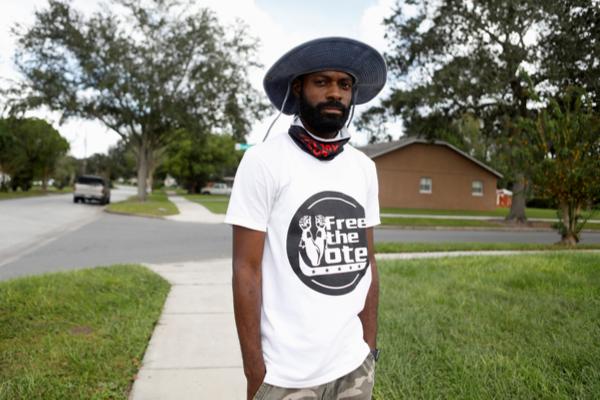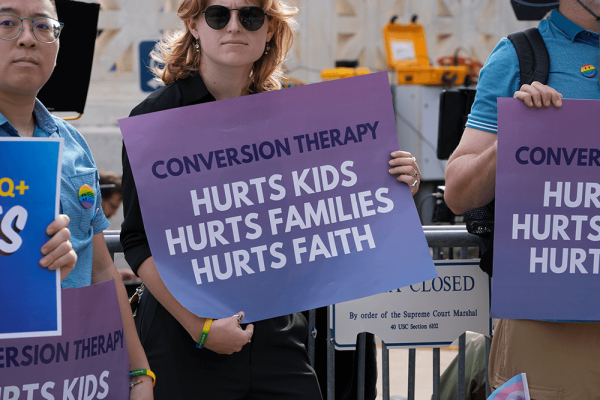Euka Wadlington is among a group of 2020 voters who cast a ballot for the next president of the United States for the first time in many years.
After serving more than 20 years for two nonviolent federal drug convictions, Wadlington was released from custody last spring. Registered to vote in Illinois where Joe Biden won the state’s 20 Electoral College votes, Wadlington chose not to share his thoughts on the outcome of the top race in this year’s election.
However, he didn’t hold back his appreciation for the passage of the First Step Act, a bipartisan criminal justice reform law signed by President Donald Trump in 2018. Hailed as the first major sentencing reform in decades, the law addresses policy that resulted in lengthy and even life sentences for what some have called low-level drug offenses.
Though Wadlington didn’t gain freedom through the First Step Act himself, he says it has helped several residents of FCI Greenville, a medium security federal prison in central Illinois where he was detained for 21 years.
More than 90 percent of federal detainees who have received sentence reductions under the First Step Act are African American. However, the law only applies to people with federal convictions. As of June 2020, the legislation has resulted in the early release of 3,363 federal detainees due to retroactive application of reduced sentencing laws related to crack cocaine. In July 2019, 3,100 people were released due to the law's increased credit for good conduct. An additional 2,000 people have been approved for transfer to detention facilities closer to home (as of February 2020) and about 1,000 older inmates have been transferred to home confinement (as of May 2020).
“He has done some decent things. I can’t take that away from him,” Wadlington said of Trump. “His son-in-law was the one who put that First Step Act into play and that has saved a lot of guys' lives who were locked up behind bars.”
Trump senior adviser Jared Kushner, whose own father pled guilty to tax fraud in 2004 and served 14 months in federal prison, championed the bill with Democratic and Republican lawmakers in time to get it on his father-in-law’s desk four days before Christmas Day 2018.
Voting on justice
Mass incarceration disproportionately affects Black Americans; in a 2018 report to the U.N. about racial disparities in the U.S. criminal justice system, the Sentencing Project noted that African American adults are 5.9 times more likely to be incarcerated than whites. And as the Sentencing Project explained in a 2019 report, the First Step Act does “not provide the systemic change necessary to undue the harm caused by decades of mass incarceration at the federal level fueled by mandatory minimums and federal prosecutors’ focus on extreme punishments for street-level crime.”
Nevertheless, the Trump campaign hoped that First Step Act — along with the “Platinum Plan” it unveiled less than six weeks before Election Day — would encourage African Americans to cast their ballots for the president.
“After years of neglect by Democrat politicians, Black Americans have finally found a true advocate in President Trump, who is working tirelessly to deliver greater opportunity, security, prosperity, and fairness to their communities,” the campaign said in a September 25th news release about the “Platinum Plan,” which promised additional criminal justice reforms and investments in the Black community.
At his rallies, Trump emphasized his law and order platform, but during the televised presidential debates, he touted his work on criminal justice reform as proof that he has done more for African Americans than any president since Abraham Lincoln signed the Emancipation Proclamation. Trump chided Biden for not accomplishing criminal justice reform during Biden’s six terms in the U.S. Senate and his two terms as vice president.
Throughout the 2020 election, then-candidate Joe Biden often stumbled when asked to explain why he supported the 1994 Violent Crime Control and Law Enforcement Act. The law, which Biden helped write to address rising rates of violent crime, included harsher federal sentencing, increased funding for state prisons, and supported state policies that required prisoners to serve at least 85 percent of their prison sentence with no possibility of early release. In 1994, more than three dozen African American religious leaders expressed support for funding within the legislation that would create prevention and drug treatment programs as well as bring more policing to high-crime areas.
But while seeking the nomination in 2020, Biden said that he wants to reverse the effects of those policies, reduce incarceration, address systemic misconduct in police departments, add mental health counselors to police departments, and end mandatory minimum sentencing. On his campaign website, Biden supported the Safe Justice Act to improve federal sentencing and reentry and a $20 billion grant program for states to develop initiatives that shift the focus from incarceration to prevention. He also called for an end to solitary confinement, adequate healthcare for female prisoners, and a review of programs that allow parents to serve their sentence through in-home monitoring instead of incarceration.
“We are not fooled”
Despite Trump’s attempts to position himself as the better choice, some formerly incarcerated voters viewed the current administration’s commitments to criminal justice reform with skepticism.
“There’s an assumption that formerly incarcerated people are not politicized or informed enough to recognize what’s happening to us and that’s actually very insulting,” Brittany White, decarceration manager for the LIVE FREE campaign at nonpartisan Faith in Action, told Sojourners while enroute to Florida to participate in Election Day events focused on getting people with criminal records out to vote.
These new voters observed a contradiction between the Trump administration's professions of support for criminal justice reform while at same time calling for greater policing in minority communities.
“We understand that this policy is being used to distract us from the fact that you are policing us at a greater rate than ever before,” said White, who spent five years at an Alabama correctional facility after being convicted of drug trafficking and now works to engage newly enfranchised voters. “We are not fooled by this First Step Act and the other minor policies that have been implemented.”
Brennan Center for Justice senior fellow Theodore R. Johnson, who researches the role that race plays in electoral politics, issue framing, and disparities in policy outcomes, agrees with White.
“The visual of the president is one that remains heavily on the use of executive force — the use of law enforcement. That doesn’t align with a guy who recognizes the criminal justice system is unfair and racist and needs reform,” he told Sojourners.
Preliminary numbers from the national exit poll showed support for Trump among Black men at about 19 percent in 2020, compared with 13 percent in 2016.
But Johnson pointed instead to data from APVoteCast, which incorporated a larger sample of voters and found 8 percent of Black voters supporting the current administration. For Johnson, this illustrates that Trump didn’t gain new ground for his administration or the Republican Party with Black voters.
“At best Black Republicans feel comfortable voting for Republican candidates. At worst Trump only managed to replicate the poor showing that he had in 2016,” Johnson said. Prior to the Obama election cycles, about 11.5 percent of Black voters supported the Republican candidate in presidential contests as far back as 1968.
Overall, Johnson says it’s unlikely that the Trump administration’s role in the First Step Act increased Black voters’ support for the president.
“[Trump’s] criminal justice bill that he is touting didn’t touch state and local jails and prisons, which are the places that most of us who know people who are incarcerated — that’s where they are — in state and local jails. And they’re still there. They didn’t get a First Step Act,” Johnson said. More than 80 percent of the 1.5 million incarcerated people in the U.S. are detained at state correctional facilities, according to the Bureau of Justice Statistics.
“This current administration does not have a large enough imagination to encapsulate the needs of current and formerly incarcerated people,” White said.
A new voting bloc?
Until recently, the roughly 6.5 million people in the U.S. who are either incarcerated, on probation, or on parole have never been considered a voting bloc by either political party. Even as the 2018 state constitutional Amendment 4 in Florida restored voting rights to about 1.4 million people with records, Republican lawmakers tried to reduce its impact with a policy that required returning citizens to pay all state fines and fees before being allowed to register. Campaigns held in the final weeks before Election Day raised public and private donations to pay off outstanding criminal justice debts that would enable 50,000 formerly incarcerated people to register.
Proponents of restoring voting rights for formerly incarcerated people in California also celebrated a win this election season. The state passed a ballot initiative that would open up the voting booths to people on parole, adding about 50,000 people to the electorate. California joins 16 other states that, in recent years, have approved initiatives that allow people to vote once they finish their prison sentences.
As restoration of voter rights becomes a more common component of prisoner reentry, these policies may interest newly enfranchised people who are looking for candidates that campaign to do more to support their own reintegration back into their communities. They also want to improve the lives of the people they have left behind.
“It’s not just a ‘me’ mentality. When we begin to talk about a voting base for us, that includes people who are currently in jail,” White said. One of White’s top three initiatives at Faith in Action includes advocating for better health and safety conditions inside correctional facilities starting with Illinois’ Cook County Jail, which became known as a hotspot for COVID-19 infections this spring.
“I have a friend who is still currently incarcerated in the state of Alabama who has been sent off for the maximum amount of time — five years — twice. And I’m just as invested in her coming home and anybody else as I am in my own freedom.”
Got something to say about what you're reading? We value your feedback!







